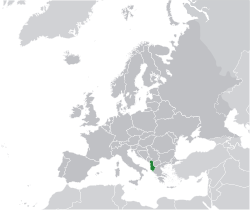Albania Replaces Secret Service Chief
By Besar Likmeta
The Albania president has fired the head of the State Security Agency, SHISH, replacing him with the Deputy Minister of Innovation, Visho Ajazi Lika.
Bahri Shaqiri was nominated as the head of the Albanian State Intelligence Service, SHISH, in January 2005 and was widely respected for his professionalism, particularly for ensuring that key security institutions did not fall under political influence.
Due to his fierce independence, however, he also gained enemies. The government of Prime Minister Sali Berisha repeatedly cut the agency’s funding since assuming power.

Although the government sought to replace him, former presidents Moisiu and Bamir Topi supported Shaqiri.
According to Albanian law, the head of SHISH can only be replaced at a proposal by the prime minister, which has to be approved by the president.
In 2010, Berisha tried to fire Shaqiri by amending the Secret Service Law, but faced opposition by NATO and the United States, Albania’s key ally.
After the January 2011 riots, relations between Shaqiri and the government hit rock bottom when he was accused of orchestrating a coup d’état with President Bamir Topi, the General Prosecutor and the opposition.
The government has yet to produce any evidence for the accusations.
Shakiri’s successor, Ajazi Lika, is a mathematician with a PHD from the University of Tirana and he served as diplomat in the Democratic Party run government from 1993-1997.
After 1997, he immigrated to Canada and return in 2005, initially as an adviser to Berisha, and later as deputy minister.
According to local media, he was close to Berisha’s former secret service chief, General Bashkim Gazidede, which headed the service from 1992 to 1997.
